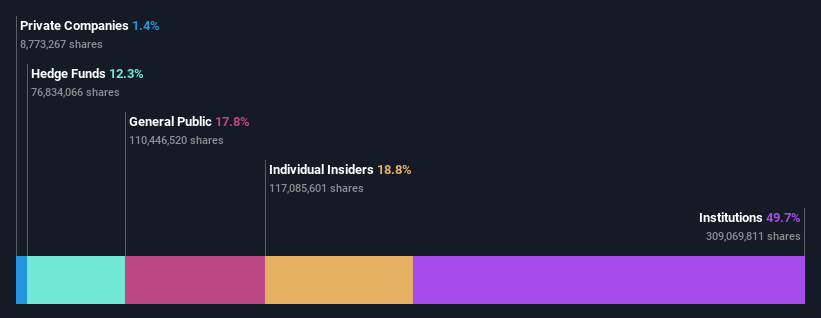After losing 25% in the past year, Aura Energy Limited (ASX:AEE) institutional owners must be relieved by the recent gain
Key Insights
Institutions' substantial holdings in Aura Energy implies that they have significant influence over the company's share price
56% of the business is held by the top 5 shareholders
If you want to know who really controls Aura Energy Limited (ASX:AEE), then you'll have to look at the makeup of its share registry. We can see that institutions own the lion's share in the company with 50% ownership. That is, the group stands to benefit the most if the stock rises (or lose the most if there is a downturn).
Institutional investors would probably welcome last week's 18% increase in the share price after a year of 25% losses as a sign that returns may to begin trending higher.
In the chart below, we zoom in on the different ownership groups of Aura Energy.
View our latest analysis for Aura Energy
What Does The Institutional Ownership Tell Us About Aura Energy?
Many institutions measure their performance against an index that approximates the local market. So they usually pay more attention to companies that are included in major indices.
As you can see, institutional investors have a fair amount of stake in Aura Energy. This implies the analysts working for those institutions have looked at the stock and they like it. But just like anyone else, they could be wrong. When multiple institutions own a stock, there's always a risk that they are in a 'crowded trade'. When such a trade goes wrong, multiple parties may compete to sell stock fast. This risk is higher in a company without a history of growth. You can see Aura Energy's historic earnings and revenue below, but keep in mind there's always more to the story.
It looks like hedge funds own 12% of Aura Energy shares. That catches my attention because hedge funds sometimes try to influence management, or bring about changes that will create near term value for shareholders. Macquarie Group, Ltd., Banking & Securities Investments is currently the company's largest shareholder with 13% of shares outstanding. With 12% and 12% of the shares outstanding respectively, MM Asset Management Inc and The Lind Partners, LLC are the second and third largest shareholders. Additionally, the company's CEO David Woodall directly holds 2.6% of the total shares outstanding.
On looking further, we found that 56% of the shares are owned by the top 5 shareholders. In other words, these shareholders have a meaningful say in the decisions of the company.
While it makes sense to study institutional ownership data for a company, it also makes sense to study analyst sentiments to know which way the wind is blowing. Our information suggests that there isn't any analyst coverage of the stock, so it is probably little known.
Insider Ownership Of Aura Energy
The definition of an insider can differ slightly between different countries, but members of the board of directors always count. The company management answer to the board and the latter should represent the interests of shareholders. Notably, sometimes top-level managers are on the board themselves.
I generally consider insider ownership to be a good thing. However, on some occasions it makes it more difficult for other shareholders to hold the board accountable for decisions.
Our most recent data indicates that insiders own a reasonable proportion of Aura Energy Limited. Insiders own AU$30m worth of shares in the AU$162m company. We would say this shows alignment with shareholders, but it is worth noting that the company is still quite small; some insiders may have founded the business. You can click here to see if those insiders have been buying or selling.
General Public Ownership
The general public, who are usually individual investors, hold a 18% stake in Aura Energy. While this size of ownership may not be enough to sway a policy decision in their favour, they can still make a collective impact on company policies.
Next Steps:
It's always worth thinking about the different groups who own shares in a company. But to understand Aura Energy better, we need to consider many other factors. For instance, we've identified 3 warning signs for Aura Energy (2 shouldn't be ignored) that you should be aware of.
Of course this may not be the best stock to buy. So take a peek at this free free list of interesting companies.
NB: Figures in this article are calculated using data from the last twelve months, which refer to the 12-month period ending on the last date of the month the financial statement is dated. This may not be consistent with full year annual report figures.
Have feedback on this article? Concerned about the content? Get in touch with us directly. Alternatively, email editorial-team (at) simplywallst.com.
This article by Simply Wall St is general in nature. We provide commentary based on historical data and analyst forecasts only using an unbiased methodology and our articles are not intended to be financial advice. It does not constitute a recommendation to buy or sell any stock, and does not take account of your objectives, or your financial situation. We aim to bring you long-term focused analysis driven by fundamental data. Note that our analysis may not factor in the latest price-sensitive company announcements or qualitative material. Simply Wall St has no position in any stocks mentioned.

 Yahoo Finance
Yahoo Finance 

